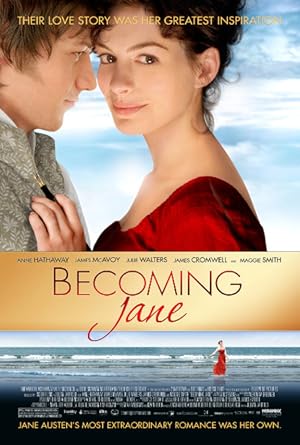
Becoming Jane Page #3
Well done, Jane.
Bravo.
Well done.
She speaks so well.
Well, excessively charming, I thought.
Well, accomplished enough, perhaps,
but a metropolitan mind may be
less susceptible to extended, juvenile self-regard.
Well, thank you.
We're both very proud.
# In airy dreams
#... absent love to see
# Dear you, oh, to think
# On thee #
Careful there, old fellow.
Fine piece, Mr Lefroy.
Handled a gun before, have you, Tom?
Mmm.
- Tom!
Jesus!
- Tom.
- Uncle?
Why not try a walk?
There's some very fine country round about.
Very fine.
A walk.
Miss!
Miss! Miss!
Miss! Miss, I...
Miss?
Miss?
- Miss...
- Austen.
Mr Lefroy.
Yes, I know, but I am alone.
- Except for me.
- Exactly.
Oh, come!
in this rural situation?
We have been introduced, have we not?
What value is there in an introduction
when you cannot even remember my name?
Indeed, can barely stay awake in my presence.
Madam.
These scruples must seem very provincial
to a gentleman with such elevated airs,
but I do not devise these rules.
I am merely obliged to obey them.
I have been told
there is much to see upon a walk
but all I've detected so far is a general
tendency to green above and brown below.
Yes, well, others have detected more.
It is celebrated.
- There's even a book about Selborne Wood.
- Oh.
A novel, perhaps?
Novels?
Being poor, insipid things, read by mere women,
even, God forbid, written by mere women?
I see, we're talking of your reading.
As if the writing of women did not display
knowledge of human nature,
the liveliest effusions of wit and humour
and the best-chosen language imaginable?
- Was I deficient in rapture?
- In consciousness.
It was...
It was accomplished.
It was ironic.
- And you're sure I've not offended you?
- Not at all.
My lords, ladies and gentlemen,
the Grand Vizier's Flight.
- May I have the honour?
- How kind, cousin.
- Miss Austen.
- Mr Wisley.
May I have the pleasure of this next dance?
Oh, no, we're so late.
Take care.
Oh, thank you, Tom.
Hurry.
Lucy.
Oh!
I am mortified.
I practised, but it won't stick.
What a lovely pair they make.
Ah, Sister.
What do you make of Mr Lefroy?
We're honoured by his presence.
You think?
He does, with his preening, prancing,
Irish-cum-Bond-Street airs.
Jane.
Well, I call it very high indeed, refusing
to dance when there are so few gentleman.
- Henry, are all your friends so disagreeable?
- Jane.
Where exactly in Ireland
does he come from, anyway?
Limerick, Miss Austen.
I would regard it as a mark of extreme favour
if you would stoop
to honour me with this next dance.
Translation
Translate and read this script in other languages:
Select another language:
- - Select -
- 简体中文 (Chinese - Simplified)
- 繁體中文 (Chinese - Traditional)
- Español (Spanish)
- Esperanto (Esperanto)
- 日本語 (Japanese)
- Português (Portuguese)
- Deutsch (German)
- العربية (Arabic)
- Français (French)
- Русский (Russian)
- ಕನ್ನಡ (Kannada)
- 한국어 (Korean)
- עברית (Hebrew)
- Gaeilge (Irish)
- Українська (Ukrainian)
- اردو (Urdu)
- Magyar (Hungarian)
- मानक हिन्दी (Hindi)
- Indonesia (Indonesian)
- Italiano (Italian)
- தமிழ் (Tamil)
- Türkçe (Turkish)
- తెలుగు (Telugu)
- ภาษาไทย (Thai)
- Tiếng Việt (Vietnamese)
- Čeština (Czech)
- Polski (Polish)
- Bahasa Indonesia (Indonesian)
- Românește (Romanian)
- Nederlands (Dutch)
- Ελληνικά (Greek)
- Latinum (Latin)
- Svenska (Swedish)
- Dansk (Danish)
- Suomi (Finnish)
- فارسی (Persian)
- ייִדיש (Yiddish)
- հայերեն (Armenian)
- Norsk (Norwegian)
- English (English)
Citation
Use the citation below to add this screenplay to your bibliography:
Style:MLAChicagoAPA
"Becoming Jane" Scripts.com. STANDS4 LLC, 2024. Web. 8 May 2024. <https://www.scripts.com/script/becoming_jane_3787>.


Discuss this script with the community:
Report Comment
We're doing our best to make sure our content is useful, accurate and safe.
If by any chance you spot an inappropriate comment while navigating through our website please use this form to let us know, and we'll take care of it shortly.
Attachment
You need to be logged in to favorite.
Log In